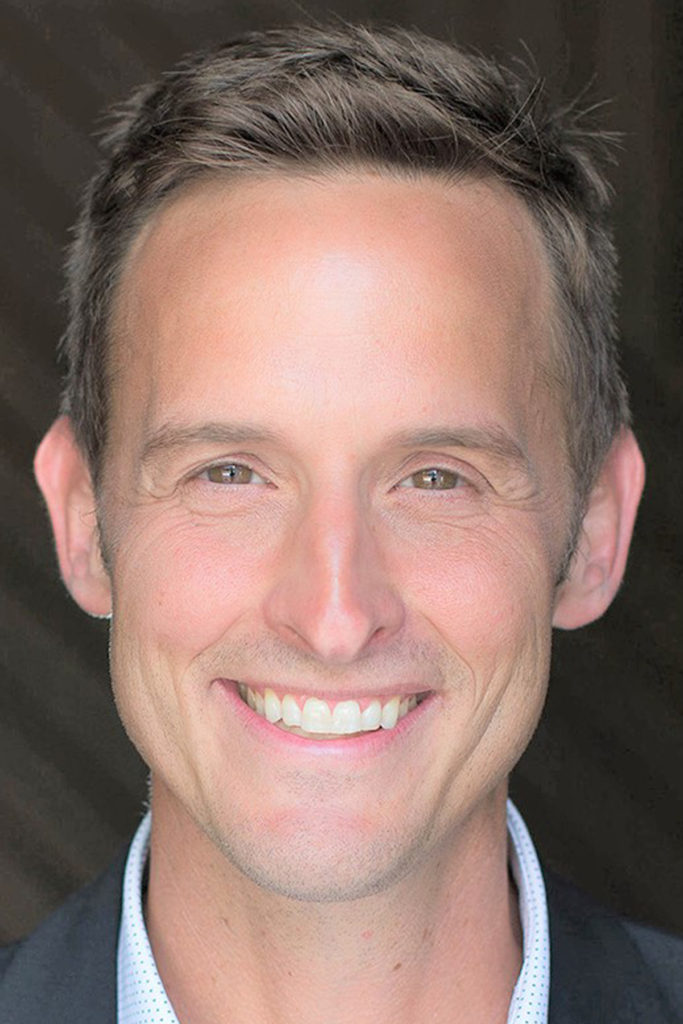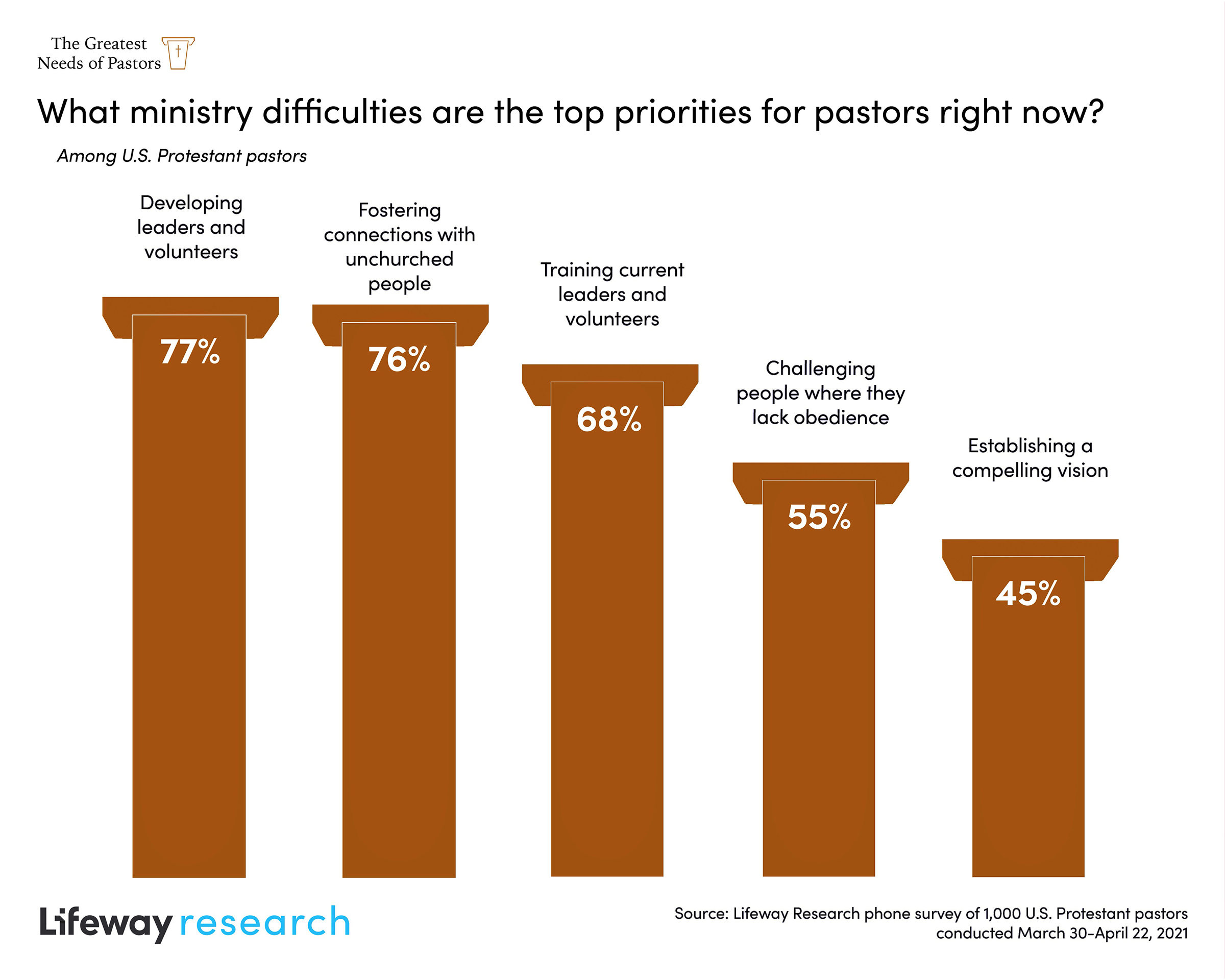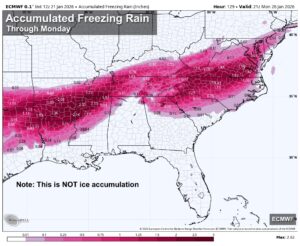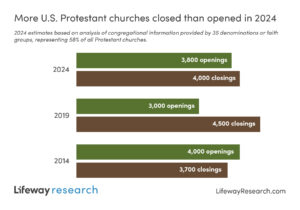NASHVILLE, Tenn. — The 2022 Greatest Needs of Pastors study by LifeWay Research revealed that U.S. Protestant pastors believe developing leaders and connecting with people not involved with a church are their two most prominent ministry needs.

“Paul’s instructions to ‘preach the word; be ready in season and out of season’ strike a chord within pastors like never before,” said Ben Mandrell, president of Lifeway Christian Resources of the Southern Baptist Convention, the Nashville-based parent ministry of LifeWay Research.
“In the midst of ministry challenges, it’s no surprise that their top felt needs are multiplying leaders and reaching the unchurched,” Mandrell observed.

Scott McConnell, executive director of Lifeway Research, noted that despite pastors having many personal needs, they often place a higher priority on the needs of their churches.
“There is much agreement around the areas of ministry that need their attention today, because these needs have been the core work of disciple-makers since the Great Commission: equipping believers to share the Gospel with unbelievers,” McConnell said.
Pastoral concerns
For the 2022 Greatest Needs of Pastors study, Lifeway Research interviewed 200 U.S. Protestant pastors who identified 44 issues they face in their roles, and then surveyed 1,000 additional pastors to determine which of these needs was most prevalent. The needs were then divided into seven categories:
— Ministry difficulties.
— Spiritual needs.
— Mental challenges.
— Personal life.
— Self-care.
— People dynamics.
— Skill development.
Among the five needs classified as ministry difficulties, two resonated with surveyed pastors. More than three-quarters of pastors surveyed said developing leaders (77%) and volunteers and fostering connections with unchurched people (76%) are among their greatest needs.
A majority of U.S. Protestant pastors surveyed also said training current leaders and volunteers (68%) and challenging people where they lack obedience (55%) are challenges they face. Six percent of the pastors said they did not need to give specific attention to any of these issues right now.
“Pastors are personally burdened with the need for their churches to share the Good News of Jesus Christ with their community,” said McConnell. “This makes their personal priority list because their church is often less effective than it used to be.
“In addition, many don’t even know where to start in helping their congregations connect with non-believers outside the church.”
White pastors (77%) were more likely than African American pastors (63%) to say they are finding it challenging to foster connections with the unchurched. African American pastors (68%) were the least likely to say they need to give attention to developing leaders and volunteers.
The youngest pastors in the survey, those ages 18-44, were more likely (82%) than the oldest pastors, those ages 65 and older (71%), to find forming connections with the unchurched an area in which they need to invest more time.
Similarly, younger pastors (82%) were more likely than older pastors (70%) to feel the need to give attention to developing leaders and volunteers, as well as training current leaders and volunteers (74% and 62%, respectively).
Pastors at larger churches were more likely to say connecting with the unchurched is a difficulty to which they need to give attention. Those at churches with attendances of 100-249 (79%) and 250 and more (81%) identify this as a need more than those at churches with fewer than 50 in attendance (70%).
Pastors of churches with more than 100 in attendance (81%) are more likely than those at churches with fewer than 50 attendees (72%) to say they need to give attention to developing leaders and volunteers.
Evangelical pastors (63%) were more likely than mainline pastors (43%) to say they need to invest in challenging people where they lack obedience.
Greatest need
When asked to narrow down the list to the ministry difficulty in which they most needed to invest at this time, 28% said fostering connections with unchurched people and developing leaders and volunteers (25%).
Those challenges were also near the top when pastors were asked to pick the greatest need they face among each of the 44 identified issues. For eight percent of U.S. Protestant pastors, connecting with those not involved with a church is their single largest need. Another seven percent point to developing leaders and volunteers in their congregation.
“Three of the five ministry difficulties pastors need to personally address… reflect that ministry is done together,” said McConnell. “Motivating, developing, and training leaders and volunteers are all needed for a congregation to function as one unit in sharing the love of Jesus with others.”
Specifically among the five ministry difficulties, 15% of pastors said training their church leaders and volunteers currently requires most of their attention. Fewer said their top ministry difficulty right now is establishing a compelling vision (13%) or challenging people where they lack obedience (11%).
Pastors in the Northeast U.S. (16%) were the least likely to say fostering connections with unchurched people is their top ministry difficulty. Pastors in that region (34%) were, however, more likely than those in the South (23%) and West (23%) to say that developing leaders and volunteers is their greatest need among the five ministry issues.
Many small church pastors agreed they’re struggling with the vision of their church. Those in churches with fewer than 50 in attendance (15%) and from 50 -99 (16%) were more likely than pastors of churches with 250 or more in attendance (eight percent) to say establishing a compelling vision is the most pressing ministry difficulty for them.
For more information, view the complete report or visit LifewayResearch.com/GreatestNeeds.








